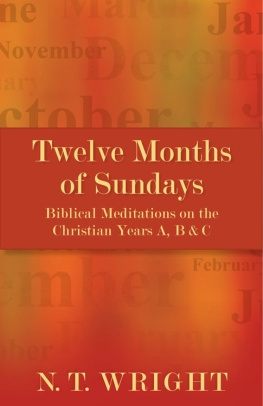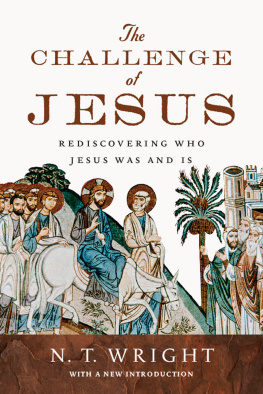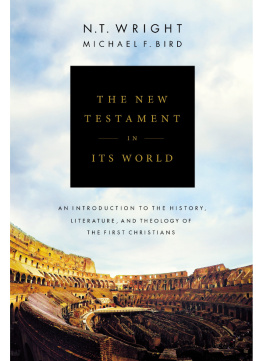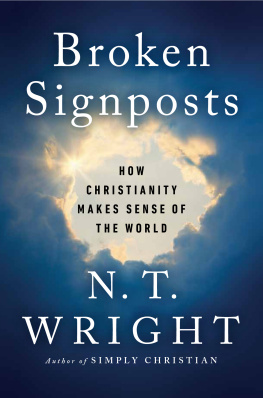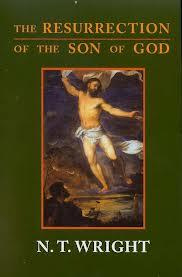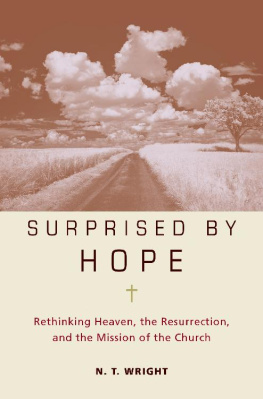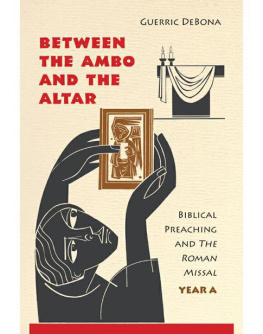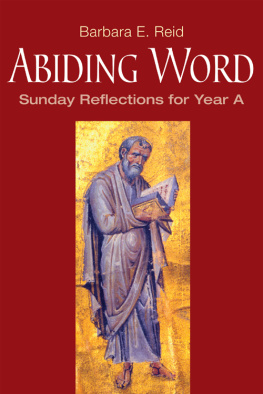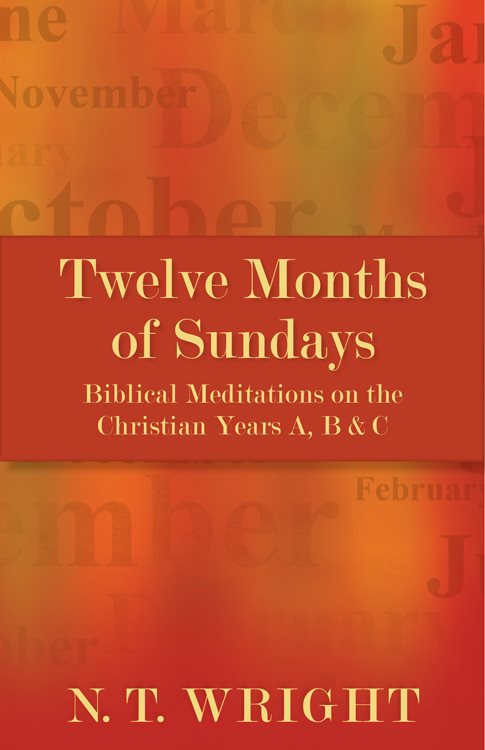Tom Wright, until recently Bishop of Durham, is currently Research Professor of New Testament and Early Christianity at the University of St Andrews and is a regular broadcaster on radio and television. He is the author of over fifty books, including the For Everyone guides to the New Testament, the best-selling Simply Christian and Surprised by Hope, and the magisterial series entitled Christian Origins and the Question of God.
Twelve Months of Sundays
Years A, B and C
Biblical meditations on the Christian year

Tom Wright

Copyright Tom Wright 2000, 2001, 2002, 2012
All rights reserved. No part of this book may be reproduced, stored in a
retrieval system, or transmitted in any form or by any means, electronic
or mechanical, including photocopying, recording, or otherwise,
without the written permission of the publisher.
First published in Great Britain as Twelve Months of Sundays,
Years A, B and C: Biblical meditations on the Christian year in 2012
Society for Promoting Christian Knowledge
36 Causton Street
London SW1P 4ST
www.spckpublishing.co.uk
First published in the United States in 2012 by
Morehouse Publishing, 4775 Linglestown Road, Harrisburg, PA 17112
Morehouse Publishing, 445 Fifth Avenue, New York, NY 10016
Morehouse Publishing is an imprint of Church Publishing Incorporated.
www.churchpublishing.org
Cover design by Laurie Klein Westhafer
Library of Congress Cataloging-in-Publication Data
A catalog record of this book is available from the Library of Congress.
ISBN-13: 978-0-8192-2802-4 (pbk.)
ISBN-13: 978-0-8192-2803-1 (ebook)
Contents


This book brings together my reflections based on the weekly biblical readings in the official lectionary now in use in the Church of England. The pieces first appeared in the Church Times; the encouraging response to them suggested that they should be made available in a more permanent form.
The lectionary offers a three-year cycle of readings, set out in The Christian Year (Church House Publishing, 1997). This volume of reflections covers Years A, B and C. No attempt has been made to cover the readings for the various Saints Days that may from time to time fall on a Sunday. Every possible regular Sunday, however, has been covered, including the extra Propers provided after Epiphany when Easter is late and after Trinity when Easter is early. I have used the continuous set of readings for the Sundays in Ordinary Time after Trinity, rather than the related set in each case.
Where the official lectionary suggests a passage consisting of clumps of verses selected out of a longer paragraph or chapter, I have sometimes simply listed, and commented on, the entire passage. I am well aware that it is often impossible to read as much Scripture during the course of a well-ordered liturgy as the integrity of the text might seem to require. But it is important that the serious reader, let alone the preacher, be aware of the whole from which the parts are taken, and interpret those parts in the light of that whole.
I assume that the reader will have the biblical texts to hand, preferably in more than one good modern translation. These pieces are not, of course, a full commentary on the passages. They are personal reflections designed to stimulate fresh thought. If they prompt the reader to his or her own exploration, understanding and love of the text, and of the God of whom it speaks, my purpose will have been more than accomplished.
My thanks are due to Paul Handley, Editor of the Church Times, and to the editorial assistant Yolande Clarke, for the invitation to write these reflections in the first place and for the patient encouragement which has kept me to the task. I am grateful, too, to SPCK for accepting the project, and to Joanna Moriarty and Mary Matthews who have helped bring it to completion.
Tom Wright
The First Sunday of Advent

Isaiah 2.15
Romans 13.1114
Matthew 24.3644
With the lectionarys new year comes St Matthew, with warnings about the days of Noah. Noahs solitary gospel cameo; he doesnt feature much in the epistles, either. Why not?
The point about Noahs days is that they were ordinary. Eating, drinking, family life as usual; no signs, no hint of what is to happen. This contrasts with the previous verses, where detailed signs herald Jerusalems destruction; some suggest that this is a different day and hour, the second coming itself, which might occur at any time, not necessarily after a generation. Alternatively, these warnings too can be interpreted as relating to Jerusalems fall, but as referring narrowly to the specific moment of calamity.
From early days, however, Christians have read this text as referring to the ultimate future, the day for which even AD 70 was just a rehearsal, the day when some will be taken (in judgement) and others left (in mercy). If we wish to read the text this way, however, we must temper it with the emphasis of Paul: do not suppose that you are at the moment simply in darkness, with nothing to do before the great day arrives. The day has already begun to dawn with the coming of Jesus, so that Jesus followers are already people of the day. The promise and warning of Gods future is meant to inculcate neither helplessness nor complacency, but rather energy to work as day-people in a world that thinks its still night.
Paul has his own detailed agenda of what this will mean. No night-behaviour: many of the sins he lists in v. 13 may have been nocturnal in Rome, but his point is clearly metaphorical, since quarrelling and jealousy keep no special hours. Those who clothe themselves with the Lord of the day must renounce all such behaviour; sinful practices, particularly those of the flesh, will shriek that its unnatural to say no to them, but once the day has dawned the shadows cannot dictate to the sunlight, nor the nightmares to the mornings tasks.
For Paul, then, the great event for which Israel had longed had already arrived in Jesus. This means that prophecies like Isaiah 2 are already brought to birth in Gods reality. Paul saw his own mission to the Gentiles as the fulfilment of Isaiahs promise: the nations were already coming in to Gods people, to hear the message of salvation that the creator God had entrusted to the Jews, and had fulfilled in the Jewish Messiah. Isaiahs promise of universal peace must therefore be read, like Pauls call to personal holiness, as our present agenda. We must neither look helplessly at a dark and sleeping world, nor think complacently that we, the church, are all right as we are. We must wake people up to the fact that the sun is already shining, and that the judge of the nations is at the door, longing to see his justice and peace enfold the world in a single embrace.
The Second Sunday of Advent


